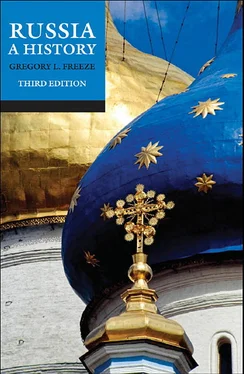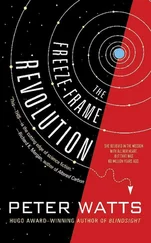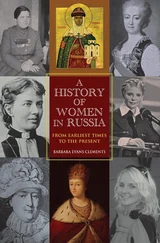RUSSIA
A History
Third Edition
Edited by Gregory L. Freeze
Russia, it is fair to say, does not automatically evoke feelings of empathy and goodwill in the West: the media, politicians, and even many scholars regard Russia with a mixture of condescension, antipathy, and fear. Not that Russia, or at least its rulers, has not done much to deserve the hostility; territorial expansion and brutal violation of human rights—by both the old and new regimes—provide ample fodder for those predisposed to characterize Russia as a threat to Western civilization. But the pervasive antipathy is often dismissive of the favourable dimensions of the Russian experience; a Russophobic tone too often becomes the default, reinforcing ill-informed stereotypes of omnipotent authoritarianism, backwardness, and alcoholism. These stereotypes have deep historic roots, dating back to the sixteenth-century travellers’ accounts, but only came to dominate popular images of Russia in the modern period, which were shaped by anti-Russian diatribes in the mass media of the nineteenth century and, far more profoundly, by the ideological battles of the twentieth century and the Cold War. Historical scholarship on Russia has done, until recently, too little to correct these politicized stereotypes and produce a more balanced, better informed picture. Scholarly studies of Russia, in fact, appeared rather belatedly, most of them after the Second World War, and long bore the taint and distortions of the Cold War.
This volume takes advantage of two major developments in the field—one conceptual, the other empirical. Conceptually, Russian historians have turned from a narrow focus on political history and given, increasingly, more attention to society, economy, and culture. The result is a more sophisticated appreciation for the importance for the other spheres, not merely as ‘reflecting what the state demands’, but in shaping the course of Russian history. This means ascribing more agency to historical actors and appreciating the role of culture, especially religion, in shaping popular culture and political behaviour. Empirically, recent scholarship takes advantage of the ‘archival revolution’ that followed the break-up of the USSR, which enabled unprecedented access to archival sources, especially for the twentieth century. The archival revolution of 1991 was neither sudden (it had antecedents in the previous decade) nor complete (much, in particular the police archives, offers at best nominal access). Nevertheless, serious scholarship on Russian history in the twentieth century has become possible; scholars are no longer forced to rely on party directives, Pravda, and the selective memory in ‘memoirs’. The result has been an extraordinary, ongoing profusion of scholarship, much of it concentrated on the Soviet period, and this new research has significantly enhanced and often recast our understanding of key issues, processes, and outcomes.
But much remains fundamental, with continuities running across the centuries, from earliest times to the present. One is the role of geography: although one must be wary of geographical determinism (the notion that geography predetermined development), it certainly has had an enormous impact on Russia’s historical development. On the one hand, it has blessed the inhabitants of Russia with extraordinary natural resources—rich farmland, especially the black-earth areas to the south, and vast mineral resources (from energy like coal, natural gas, and oil, to a vast range of ferrous and non-ferrous metals). On the other hand, not all was blessed. Most fundamental is Russia’s great northern location; the Russian heartland is in a belt lying between 50 and 60 degrees northern latitude (roughly equal to central Canada); St Petersburg has the same latitude as southern Alaska. All this has meant a harsh climate, not the temperate conditions enjoyed by the United States and Europe; it also means a shorter growing season—several months fewer, giving tillers of the soil far less flexibility in adapting to the vagaries of weather. Rainfall is also fickle; it tends to be heaviest in the north-east (where the soil is less fertile) and less predictable in the south-east (the heartland of black-soil agriculture along the Volga River). And the natural resources, while rich, are dispersed; not until the coming of the railway was it possible to bring together the country’s vast reserves of iron ore and coal in areas like the Don Basin. The first millennium of Russian history, up to the nineteenth century, thus unfolded under conditions of a marginal economy—one continually visited by disaster, constrained by backward agriculture, and separate from the emerging world economy.
The sheer vastness of the land mass also had a profound impact. It not only ensured access to land, but encouraged an incessant migration that made governance and control extremely difficult. The scale and continuity of such migration led V. O. Kliuchevskii, the doyen of pre-revolutionary historians, to make internal ‘colonization’ a key factor in Russian history, even explaining the shift the political centre from Kiev to the northeast. No doubt, population movement in this immense expanse made labour (not land) the scarce resource, and that significantly complicated the task of governing, taxing, and conscripting. These problems steadily intensified since the seventeenth century, as the state steadily expanded its borders to include new regions—first in the east (Siberia) in the seventeenth century, then in the south and west in the eighteenth and nineteenth centuries (incorporating border territories from Finland to the Caucasus to Central Asia). As the Empire grew, indeed exponentially (from 1,554 square kilometres in 1328 to 14.1 million in 1646, then to 21.8 million in 1914), even extraordinary demographic growth (far higher and longer than in Western Europe) could do little to increase population density. As a result, by 1913 the inhabitants per square kilometre in Russia were just 7.5 (compared to 182 in Great Britain, 124 in Germany, and 74 in France).
That population was not only dispersed but increasingly diverse: expansion brought an increasing proportion of non-Russians into the Empire. The non-Russians were hardly new; some small ethnic minorities were already incorporated in Muscovite Rus’ by the sixteenth century; already by 1719 ethnic Russians comprised only 70.7 per cent of the population (with Ukrainians representing another 12.9 per cent, along with various other groups). That was but a prelude to the rapid growth of non-Russian minorities in the eighteenth and nineteenth centuries. By 1914 Russian had decreased from a majority to the largest minority (44.6 per cent) of the Empire; other major groups included Ukrainians (18.1 per cent), Belorussians (4.0 per cent), Poles (6.5 per cent), Jews (4.2 per cent), Tatars (1.8 per cent), and a kaleidoscopic array of many others—Estonians, Chuvash, Kalmyks, Bashkirs, Finns, Latvians, Germans, Kazakhs, Armenians, Azeris, Uabeks, Lithuanians, Georgians, Moldavians, and numerous tiny ethnic groups. The 1917 Revolution initially reduced the quotient of non-Russians, but the re-acquisition of old territories (for example, in the South Caucasus and Central Asia) and absorption of new territories in 1939 and 1945 replenished the number of non-Russians. By the time the Soviet Union collapsed, Russians comprised a bare majority (50.8 per cent) of the USSR. In the post-Soviet era ethnic Russians again constituted a dominant, but shrinking contingent; by the early twenty-first century they comprised only 79.8 per cent of the Russian Federation (2002 census). In short, the ‘Russian’ Empire was multinational, at times reducing ethnic Russians to the status of ‘largest minority’. Not without cause did the term rossiiskii —‘Russian’, a Latin derivative used to refer to statehood, not ethnicity—come to dominate discourse in the Imperial, Soviet, and post-Soviet eras: rossiiskii became a political, not ethnic, identity.
Читать дальше












